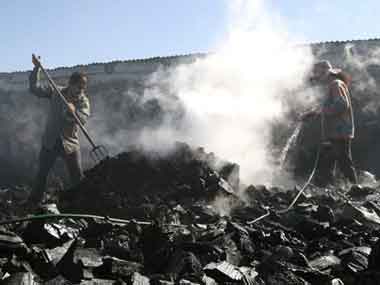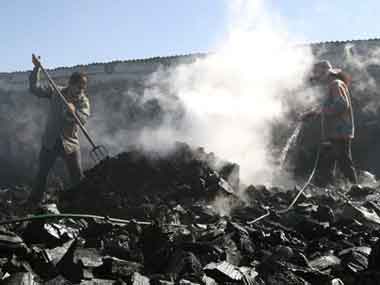It’s a landmine. The draft Mines and Minerals (Development and Regulation) Bill of the government has sent shivers down the collective spines of the energy and metals sectors. Reason: it will have to share a huge chunk of its profits, but not any of the costs, with locals.
[caption id=“attachment_38512” align=“alignleft” width=“380” caption=“Will sharing burn out profits? Reuters”]
 [/caption]
[/caption]
Here’s how it will hurt:
- Coal miners will have to part with 26% of their previous year’s mining profits.
- In new mines, lessees will have to hand over 26% of shareholdings to locals.
- In existing mines, 26% of profits will have to be handed over to local residents.
- For other mining activities, companies will have to pay twice their existing amount of royalty to government that they are currently paying.
Little wonder, the metals and mining sector is crying all the way to the bourses. At 2pm, the Bombay Stock Exchange Metals index was down 2.3%. Coal India crashed 7.1%. Other mining companies too were a bit under the weather.
Broking firm IIFL, in a quick sensitivity analysis, has said that Coal India’s earnings per share will drop 15% if the Bill becomes law. For cement companies, it may be between 6-10%, because they mine limestone. Tata Steel shareholders will lose 6.9% of their earnings to locals in the mine areas, Hindustan Zinc 9% and Nalco 2.1%. This explains the slide in the overall metal index.
But this is only the primary effect of the Bill. If coal prices rise, can power costs be far behind? So expect higher power bills in future. Inflation will be on a permanent roll from now on.
The bill has more to do with politics than economics. It’s, therefore, likely to do more harm than good - and could well trigger a huge political clash on how the spoils are to be divided up among the poor.
Will the money be given in proportion to the land holdings they sacrificed or the number of people in the family? It just does not make sense to make locals partners for the entire mining area, when they may have sacrificed only a small parcel of land. If the entire booty is treated as a community fund, one can expect politicians and other parasites to feed off it.
Second, for how long should the profits be shared? Is it in perpetuity, or for a fixed period? Some of the coal mines in India have been operational for over 150 years, with enough potential to continue for the next 150. Singareni Coalfields, for example, have been in operation since 1886. The company has already mined 929.12 million tonnes till 2010 since its incorporation.
This also sets a bad precedent for people who have to be resettled in other economic activities like hydel power plants or, for that matter, an automobile manufacturing company. Imagine Tata Motors setting up a car plant with 26% of the profits being distributed to people who were fortunate enough to be born near the plant site. The entire low-cost manufacturing advantage that India has will be taken away if such largesse is freely distributed. Providing benefits to the people displaced is one thing, making them partners-and such large partners-is quite another.
Most of the mineral-rich states in the country are the poorest because the government has failed in its duty to provide the basic necessities despite collecting taxes from mining companies in the form of royalties and cess.
The only thing that this bill will promote is corruption and black money. One needs only to visit a marble and granite mine to get an idea of how much money is made by avoiding royalty. Rather than promoting the energy-starved coal and power sector, this bill will act as a deterrent to investors.
Worse, at a time when commodity price inflation is a big worry, the Bill will throw a lighted match on a tinder-box.
)